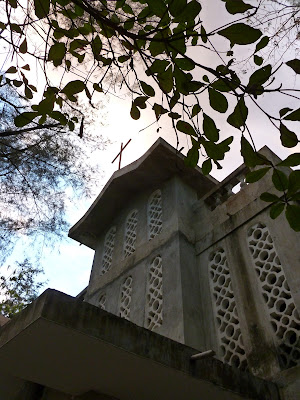Last I posted, I talked about our arrival to Cange. We were lucky enough to have lodging in the Friendship House, a wonderful guest house built and supported by the Episcopal Diocese of South Carolina. The accommodations were simple but comfortable (minus my adventures with an infestation of Haitian ants, but more on that later).
 |
| View of the Friendship House |
Two of our excursions during our time involved visiting Zanmi Lasante and Zanmi Agrikol; two associate branches of the nonprofit organization Partners in Health. As an international studies major, I'd spent nearly the entirety of last semester discussing Haiti and the possibilities for its future. Such a topic is impossible to discuss without the name of Paul Farmer. He is an American doctor from Harvard who spent part of his time before finishing his medical studies in Haiti; he was struck by the dire poverty and the desperate situation of the many who were ill and dying from treatable diseases in the surrounding areas of Cange. After returning to the US, he founded Partners in Health in Boston to funnel money to its sister organization Zanmi Lasante in Cange. Through a variety of miracles and the determination of Farmer himself, visitors to Zanmi Lasante find an oasis in Cange where a medical complex and its associated community health workers service the surrounding population of nearly 100,000. The hospital complex itself houses a variety of branches of medicine, from dentistry to obstetrics, as well as a school and church. The buildings are all large concrete structures, shaded by large trees of many varieties that Farmer has brought to the complex; the size of the trees represents an astounding contrast next to the short and stubby flora that populates the rest of Cange. Zanmi Lasante turns no one away at its doors: all who come to be treated will be treated to the best of the doctors' abilities, free of charge. I think that statement bears repeating: all who come to be treated will be treated to the best of the doctors' abilities, free of charge.
 |
| The quote at the right reads: The happiest man is he who works for the happiness of others. |
 |
| Church in the Zanmi Lasante complex |
While Zanmi Lasante has made incredible strives in improving the health of Haitians, members of the organization started identifying other problems that access to healthcare simply weren't going to cure. Malnutrition was a major cause of many other problems, but it wasn't possible to simply distribute food. Thus, the birth of Zanmi Agrikol, essentially an agricultural experimental station that works to improve the food security of the surrounding areas (this is where the Ag Economist in me gets excited!). Located just down the road from Zanmi Lasante, Zanmi Agrikol is experimenting with nearly every tree and plant they can get their hands on, simply to determine what will grow in the climate. Peanuts are their largest success thus far: they've been able to produce peanuts to be processed into plumpynut, which is a peanut paste mixed with vitamins and minerals and distributed as a medication in response to chronic malnutrition.
Beyond creating a market for peanuts, Zanmi Agrikol also runs its own extension service of sorts (those of you who read my Ecuador blog might remember my ramblings about the importance of extension). They have community agricultural workers who go out int he communities with seeds, mango tree seedlings, tools, and a goat to give to families. They give the family the needed inputs and teach them the knowledge to grow their livelihoods; when the goat kids, the kid is returned to Zanmi Agrikol to be given to another family.
We were also able to tour the new construction and agricultural technical school, which was in the process of being constructed. It was hands down the most impressive piece of architecture I witnessed in Haiti in terms of design. The idea is to provide a place to provide Haitians with the skills to provide for themselves in the basic industries the Haitian economy needs to build up in order to grow. While I imagine that the construction itself is requiring significant outside funding, future projections hope to have the school be self-sustaining through student tuition, though it will provide scholarship opportunities.
To me, it was a breath of fresh air to witness efforts in Haiti that were truly making a difference in thousands of peoples' lives as well as laying the groundwork for future generations to pull themselves up and out of their current situations. Zanmi Lasante also helps fund schools through partnerships in the area; Haitians are the staff of their organizations and they are invested in the livelihoods of the Haitians from the very beginning. It is these organizations, especially Zanmi Agrikol, that make me want to go back to Haiti and contribute somehow. VT crop and soil scientists are involved in the experimentations there; who knows, perhaps a thesis during graduate school could find its roots in Haiti?




